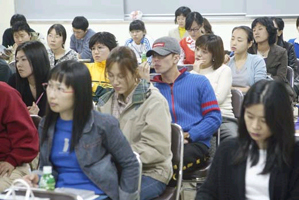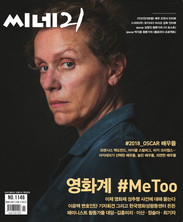한국에 사는 미국인으로서 가끔 새 문화에 적응하기 어렵지 않았냐는 질문을 받곤 한다. 일반적으로 발견한 것은, 개인적인 차원에서 한국인과 미국인의 태도나 신념과 풍습간의 차이는 열린 마음과 융통성 있는 태도로 극복할 수 있다는 것이다. 그렇지만 직장이나 학교와 같은 기관은 훨씬 더 큰 차이가 존재하는 것 같다. 내가 알고 있는 대부분의 한국 거주 외국인들의 경우 한국에서 적응하기 가장 어려운 것은 일터나 학교에서의 다른 규칙과 관행이다.
그런 의미에서 한국과 미국의 비전문가 영화팬들이 학교라는 기관 안팎에서 영화를 어떻게 배우는지를 비교하는 것은 흥미로운 일이다. 내가 대체적으로 받은 인상은 평균적으로 젊은 한국인이 미국인보다 영화미학과 영화사에 대해서는 수월하게 많이 알고 있다는 것이다. 그런 반면 미국인들은 가끔 그려지는 바와 달리 다들 블록버스터만 소비하는 둔하고 세련되지 못한 바보들은 아니다. 두 나라에서 영화를 가르치는 제도를 비교하면 두 영화구경 문화 사이의 차이점을 잘 규정할 것 같다.
많은 한국인은 미국 대학에서 영화학 강좌들이 엄청나게 인기를 끌고 있다는 것을 들으면 놀랄지도 모른다. 영화제작 강좌가 아니라 인문학 강좌로 문학과 비슷한 방식으로 영화를 분석하는 것이다. 정규 대학과 특히 4년제 학예대학(한국에는 없는 종류의 학교다)에서 다양한 전공의 학생들이 영화를 해석하고 분석하는 방법을 가르치는 강좌를 수료한다. 특히 대다수의 강좌는 영화이론과 영화에 관련된 사회적인 요인들에 초점을 맞춘다.
모두가 이 접근법을 찬양하지는 않는다. 걸출한 미국 영화평론가이자 스스로 논쟁의 대상이 되는 인물이기도 한 조너선 로젠봄은, 학원 과정에 나타난 영화미학에 대한 가벼운 태도와 영화제작자보다 영화이론가에 초점을 맞춘 것을 종종 비판하곤 한다. 그리고 나 역시 미국 학생들이 이데올로기적인 관점에서 영화를 해석하는 것에 더 숙련될지라도 영화미학과 세계적인 영화 동향에 대한 지식은 거의 없을 때가 많다고 생각한다. 물론, 한국에도 영화학 강좌가 있다. ‘김기영의 집’이라는 장대한 웹사이트(http://www.asianfilms.org/korea/kky/)도 이런 강좌의 산물이다. 그렇지만 일반적으로 한국인들은 영화를 전공하지 않는 한 이런 수업은 ‘비실용적’이라고 생각하는 것 같다. 목표지향적인 한국 교육제도에서 경영학이나 영문학이나 법학을 전공하는 학생들이 이런 수업을 들을 선택의 자유가 있는 일은 드물다(곁다리로 하는 얘기지만, 흔히 한국인이 교육을 크게 존중한다는 주장과는 견해를 달리한다. 한국인들은 학문을 위한 학문보다 고급학위가 제공하는 사회적 지위를 훨씬 더 존중하는 것 같다. 그래서 사학이나 철학과 같은 비실용적인 전공이 그렇게 적은 수의 학생을 끄는 것이다).
한국인들이 영화에 대해 형식없이 배울 가능성이 훨씬 높다. 대학 밖에서 말이다. 이런 식으로 배우는 것에 장점은 더러 있다. 일단 더 민주적이고, 수동적으로 교실에 앉아 있는 것보다 자기 관심사를 적극적으로 추구함으로써 더 잘 배울 것 같다는 점이다. 1997∼2001년 사이 고려대에서 2천명 넘는 학생을 가르쳐본 결과 학생들이 수업보다 동아리나 기타 비공식적인 활동에서 훨씬 더 실용적이고 영구적인 가치의 것을 배운다는 명백한 인상을 받았다. 이런 것이 부분적으로 왜 미국보다 한국에서 영화잡지나 클럽이나 영화제 서킷에서의 담화가 훨씬 더 생기있고 세련됐는지를 설명할지도 모른다. 반면, 미국에서의 학문적인 담화가 한국에서의 것보다 훨씬 더 발달된 것 같다.
이 두 영화문화 사이의 차이점은 이따금 오해를 불러일으키기도 한다. 지난해 연세대에서 열린 학문 세미나가 기억난다. 한국인 패널리스트가 미국에서 온 데이비드 제임스 교수의 <취화선>에 관한 프레젠테이션을 학생들이 이해하기에 “너무 난해하게” 했다며 공개적으로 나무란 일이 있었다. 그런데 나는 두 문화 모두가 서로에 배울 점이 많다고 생각한다. 한국은 대학 영화학 강좌를 더 개설한다면 유익할 것이며, 미국은 비학문적인 환경에서의 세련된 담화가 절실히 필요한 것이다.
As an American living in Korea, I'm sometimes asked if I've had trouble adjusting to a new culture. Generally I've found that on a personal level, the differing attitudes, beliefs and customs between Koreans and Americans can usually be overcome quite easily with an open mind and a flexible attitude.However, a much greater difference seems to exist in institutions, such as work and school.For most ex-pats I know, the most difficult thing about adjusting to Korea is dealing with the differing rules and practices that govern their workplace or university.
In that sense, it's interesting to compare how non-specialist film fans in Korea and the U.S. learn about cinema, both inside and outside the institution of school. My general impression is that the average young Korean is far more knowledgeable about film aesthetics and history than the average American, yet on the other hand Americans aren't all dull, unsophisticated, blockbuster-consuming idiots, as they are sometimes portrayed.Probably the best way to pinpoint the differences between the two moviegoing cultures is to compare the systems in each country that teach about film.
Many Koreans might be surprised to hear about the huge popularity of film studies courses at American universities. Not film production courses -- rather, humanities courses that analyze film in a similar manner to literature.At regular universities and particularly at four-year liberal arts colleges (a kind of school that does not exist in Korea), students of all disciplines take courses that teach them how to read and analyze films.In particular, many of the courses focus on film theory and social factors related to cinema.
Not everyone has praise for this approach. Jonathan Rosembaum, a prominent U.S. film critic who is himself a controversial figure, often criticizes academic programs for their casual attitude towards film aesthetics and their focus on film theorists, rather than filmmakers.And I think it's true that while American students have become more adept at reading films from an ideological perspective, their knowledge of film aesthetics and worldwide trends in cinema is often non-existent.
Of course, film studies courses exist in Korea too -- the magnificent House of Kim Ki-young website (http://www.asianfilms.org/korea/kky/) is the product of one such course. In general, however, it seems that Koreans consider such classes to be "unpractical," unless they are majoring in film.In the very goal-oriented Korean educational system, students majoring in business, English or law rarely have the option of taking such a class.(As an aside, I disagree with the oft-repeated claim that Koreans have great respect for education.Koreans seem to respect the social status that comes from an advanced degree far more than learning for learning's sake, which is why non-practical majors like history and philosophy have so few students)
Koreans are far more likely to learn about cinema informally, outside of the university. There are some advantages to this type of learning.It's more democratic, for a start, and people are likely to learn much better from the active pursuit of their interests, rather than passively sitting in a classroom.After having taught over two thousand students at Korea University from 1997-2001, it is my unmistakeable impression that students learn far more of useful and lasting value in their university circles and other informal activities than they do in their classes.
This may partly explain why the discourse on film in magazines, in film clubs, and on the festival circuit is much more vibrant and sophisticated in Korea than in the U.S. On the other hand, academic discourse on film in the U.S. seems far more developed than that in Korea.
The differences between the two film cultures can result in occasional misunderstandings. I remember an academic seminar held at Yonsei last year, when a Korean panelist publicly scolded U.S. professor David James for making a presentation about Chihwaseon that was "too difficult" for students to understand. But I think that both cultures could learn a lot from each other.Korea could benefit from more film studies classes at universities, and the U.S. badly needs more sophisticated discourse on film in non-academic settings.


